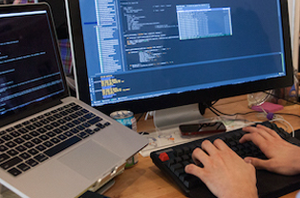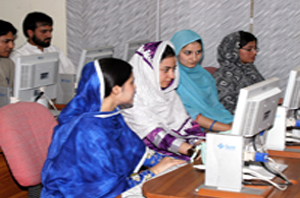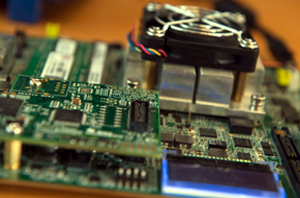Department of Computer Systems Engineering Peshawar Campus
Computer Systems Engineering is a unique blend of selected fields from electrical engineering, computer science and mathematics required to design and develop computer systems. This branch of engineering provides the Computational apparatus for technological growth in almost all fields of science and technology and has a huge impact on the economic development around the world. Once a blooming technology, it has now taken deep roots in every field of life.
The Department of Computer Systems Engineering (DCSE) strives to impart skills such as digital systems design, computer programming, software engineering, digital signal processing, control systems and microprocessor based systems design and development. Such skills are required in a broad range of technological fields such as consumer and medical electronics, custom electronic design, digital communications systems, computer networks, transport systems, factory automation and digital computer graphics.
The Computer Systems Engineering degree program is a combination of computer hardware and software engineering with a good foundation in electrical and electronics engineering. The degree programme provides a combination of basic fundamental knowledge in computer systems, practical skills in hardware and software design, general problem solving skills required in designing and building systems, verbal and written communications, final year project work, exposure to a variety of existing and leading edge electronics hardware and software technologies. The course work is organized around key areas of Computer Systems Engineering and in quite a few cases; successful completion of basic course is a pre-requisite for registration in an advanced course in a particular area.
Faculty & Staff of Computer Systems EngineeringDepartment Mission: To produce well rounded graduates, equipped with in-depth knowledge of computer systems engineering and excellent problem-solving skills, motivated to solve complex engineering problems while keeping high professional and ethical standards.
Program Educational Objectives of DCSEProgram Educational Objectives (PEOs) are broad statements that describe what graduates are expected to achieve a few years after graduation. Following are the PEOs of Computer Systems Engineering Program at UET Peshawar:
PEO 1: Graduates will serve the community through the effective use of the concepts and techniques of computer systems engineering by giving research based innovative solutions for sustainable development.
PEO 2: Graduates will exhibit aptitude for leadership, team work, collaboration, independent learning and effective interpersonal communication skills, and will abide by the code of ethics and professional practices.PEO 3: Graduates will be motivated to demonstrate continuous learning and skill development, so as to function and survive in a competitive landscape.
Program Learning OutcomesProgram Learning outcomes (PLOs) presents the narrower statements that describe what students are expected to know and be able to do by the time of graduation. Following are the set of PLOs with brief description.
1. Engineering Knowledge
An ability to apply knowledge of mathematics, science, engineering fundamentals and an engineering specialization to the solution of complex engineering problems.
2. Problem Analysis
An ability to identify, formulate, research literature, and analyze complex engineering problems reaching substantiated conclusions using first principles of mathematics, natural sciences and engineering sciences.
3. Design / Development of Solutions
An ability to design solutions for complex engineering problems and design systems, components or processes that meet specified needs with appropriate consideration for public health and safety, cultural, societal, and environmental considerations.
4. Investigation
An ability to investigate complex engineering problems in a methodical way including literature survey, design and conduct of experiments, analysis and interpretation of experimental data, and synthesis of information to derive valid conclusions.
5. Modern Tool Usage
An ability to create, select and apply appropriate techniques, resources, and modern engineering and IT tools, including prediction and modeling, to complex engineering activities, with an understanding of the limitations.
6. The Engineer and Society
An ability to apply reasoning informed by contextual knowledge to assess societal, health, safety, legal and cultural issues and the consequent responsibilities relevant to professional engineering practice and solution to complex engineering problems.
7. Environment and Sustainability
An ability to understand the impact of professional engineering solutions in societal and environmental contexts and demonstrate knowledge of and need for sustainable development.
8. Ethics
Apply ethical principles and commit to professional ethics and responsibilities and norms of engineering practice.
9. Individual and Teamwork
An ability to work effectively, as an individual or in a team, on multifaceted and /or multidisciplinary settings.
10. Communication
An ability to communicate effectively, orally as well as in writing, on complex engineering activities with the engineering community and with society at large, such as being able to comprehend and write effective reports and design documentation, make effective presentations, and give and receive clear instructions.
11. Project Management
An ability to demonstrate management skills and apply engineering principles to one's own work, as a member and/or leader in a team, to manage projects in a multidisciplinary environment.
12. Lifelong Learning
An ability to recognize importance of, and pursue lifelong learning in the broader context of innovation and technological developments.
- Academic Programs
- - B.Sc. Computer Systems Engineering
- - M.Sc. Computer Systems Engineering
- - Ph.D. Computer Systems Engineering
- Laboratories The Department boasts the following well equipped laboratories, enabling students to get a strong practical grasp of the theoretical knowledge gained in the classroom:
- - Electronics Laboratory
- - Microprocessor and Digital Electronics Laboratory
- - Digital Signal Processing & digital Design Laboratory
- - Final Year Project Laboratory
- - CISCO Laboratory
- - Huawei Laboratory
- - Communication Laboratory
- - Control System Laboratory
- - Two general-purpose Computing Laboratories
- Academies The Department has been given the status of authorized academy by global technological giants. Trainings and certifications offered in these academies help young engineers and scientists in acquiring serviceable cognitive and psychomotor skills in operating and deploying ICT modules for design and development of various solutions.
- - CISCO Academy
- - Huawei Authorized Information and Network Academy
Internships & Field Visits
Students are required to complete 800 hours of internship as part of the B.Sc degree programme, which
gives them a chance to explore and get hands-on training in their respective fields of interest.
Visits to various industries and research organizations are a part of education training of engineers.
Both long and short visits are arranged for students, providing them an opportunity to experience practical
"engineering work"
Research
The Department has a well-qualified faculty, which actively participates in the university's academic
and research activities. Research activities are carried out in a variety of fields such as Networks, Communications,
Digital Signal Processing, Control Systems, Artificial Intelligence & Expert Systems, Advanced Digital Design and
Computer Architecture, Pattern recognition and bioinformatics, digital image processing and fault tolerant computing.
Alumni
The Department encourages its Alumni to work for the welfare of the DCSE graduates.
In accordance with PEC Accreditation guidelines, DCSE Alumni holds Annual Get-Together.
Such events help fresh graduates in developing linkages and generating opportunities, collaborations, and partnerships.




